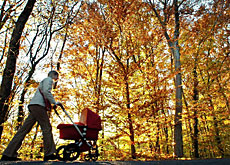The benefit jungle

Raising a child in Switzerland is an expensive proposition. But while parents sometimes get financial support, this aid varies from canton to canton.
These different child benefit systems are often considered an example of why federalism doesn’t always work.
The Swiss constitution allows the government to set child benefits, but the authorities have only done so in the agricultural sector. For other professional categories, cantonal legislation sets the guidelines.
Some companies also have their own system, in this case more generous than what the cantons usually offer.
Firms must contribute a certain amount to the child benefit scheme. In canton Zurich, this is equivalent to 1.3 per cent of the company’s payroll, while in canton Jura this figure climbs to three per cent.
The canton also dictates how much an employer must give to employees with children. But this figure varies depending on where you work.
The benefit in Switzerland – which is paid normally until a child reaches age 16 – is worth on average SFr186 ($147) per month, but you could receive as little as SFr160 or as much as SFr260.
Some cantons also demand higher payments from the third child onwards, up to SFr344 in Valais.
Payment for education
An educational benefit is also paid to parents of children still at school after the age of 16 or who are apprentices. This extends till the age of 25. In half the country’s cantons, the amount received is actually higher than the child benefit.
The biggest difference appears when at least three children are at school. Parents in Aargau or Glarus would, for example, receive SFr510 per month (three times SFr170), whereas in Valais that sum climbs to SFr1,164 (two times SFr360 plus another SFr444.)
The beneficiaries aren’t the same everywhere either. Legally speaking, a paid position gives the right to child benefit, but the law is not applied in an identical fashion all over the country.
In some cantons, the benefit is based on the number of hours you work. If your position is part-time, then you will not receive the entire benefit. But in other cantons, part-time or full-time work is not a determining factor.
The self-employed are probably the worst off. They only get the benefit in ten cantons, and nothing in the other 16.
Finally, five cantons (Valais, Fribourg, Geneva, Jura and Schaffhausen) also pay child benefit to some people without a paid job.
Baby bonus
Besides child and educational benefits, parents also get a boost from a so-called one-off baby bonus in ten cantons, ranging from SFr600 to SFr1,500.
These benefits are not the only help given to families. There are indirect subsidies such as tax breaks, although once again this depends very much on the canton.
The amount deductible for each child from the household’s income varies again depending on where you pay your taxes, as does how much you can deduct for childcare.
And if you want some help getting your children through school – especially university – you will find again that federalism adds some spice to your quest.
There is no doubt about it that Switzerland can be truly puzzling when it comes to social benefits. And that you will most likely get a headache trying to figure out how it all works.
swissinfo, Olivier Pauchard
Finding out exactly how much it costs to raise a child in Switzerland is difficult.
A study published by researchers at Fribourg University in 1994 put the figure at around SFr1,450 for the first child, and another SFr700 for each extra child. But these are only direct costs such as food, crèche fees or clothing.
There are also indirect costs, such as income lost after a parent reduces their work time, or the theoretical cost for the time spent educating children.
If direct and indirect costs are added, figures to raise a child climb through the roof, well beyond the minimal single SFr200 benefit being voted on in November.

In compliance with the JTI standards
More: SWI swissinfo.ch certified by the Journalism Trust Initiative











You can find an overview of ongoing debates with our journalists here . Please join us!
If you want to start a conversation about a topic raised in this article or want to report factual errors, email us at english@swissinfo.ch.